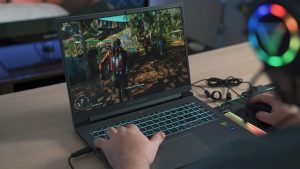The Future of Gaming: Cloud vs Local Processing
Gaming has come a long way since its humble beginnings. From the days of pixelated graphics and limited gameplay to present day, where gaming has become a multi-billion dollar industry, it’s clear that gaming has evolved tremendously. And with the advancements in technology, the future of gaming looks even more promising. One of the key debates in the gaming world currently is the battle between cloud gaming and local processing. While both have their own advantages, it’s a question of which one will prevail in the long run. In this article, we will dive into the future of gaming and explore the possibilities of cloud gaming vs local processing.
The Rise of Cloud Gaming
Cloud gaming, also known as gaming on demand, is a type of technology that allows users to play games on remote servers and stream them directly to their devices. This means that gamers no longer need to own high-end hardware to enjoy the latest and greatest games. All they need is a stable internet connection and a compatible device.
The rise of cloud gaming has been driven by the ever-increasing demand for mobility and convenience. With cloud gaming, you can play your favorite games anytime, anywhere, without the need for a console or a powerful computer. This has opened up gaming to a wider audience, as anyone with a smartphone or tablet can now access and play games.
The Advantages of Cloud Gaming
One of the biggest advantages of cloud gaming is the cost savings. Instead of shelling out hundreds of dollars for a gaming console or a high-end PC, users can now pay a monthly subscription fee to access a wide range of games. This makes gaming more affordable and accessible to a larger demographic.
Moreover, cloud gaming also allows for a seamless and immersive gaming experience. As the games are streamed from powerful remote servers, there is no need to worry about updates, downloads, or storage space. This means that players can jump into their favorite games instantly and without any interruptions.
The Power of Local Processing
Local processing, on the other hand, is the traditional way of gaming. It involves having a physical gaming console or a powerful computer that runs the games locally. This means that the game is stored and processed on the user’s device.
While local processing may seem like the outdated method of gaming, it still has a lot to offer. One of the main advantages of local processing is the higher quality graphics and performance. As the game is processed locally, there is no lag or delay, resulting in a smoother and more seamless gaming experience.
The Advantages of Local Processing
Another advantage of local processing is the increased level of control and customization. With a physical console or computer, users have the freedom to upgrade and personalize their hardware as they see fit. This allows for a more tailored and immersive gaming experience.
Additionally, local processing also offers a certain level of security. As the games are stored and processed locally, players don’t have to worry about their personal information being stored on remote servers.
The Future of Gaming
So, what does the future hold for gaming? While cloud gaming may seem like the obvious winner, local processing still has its own advantages. It’s likely that a combination of the two technologies will be the future of gaming.
One possible scenario is that cloud gaming will dominate for casual and mobile gaming, while local processing will continue to prevail for hardcore gamers who value performance and customization. This will allow for a diverse and inclusive gaming industry that caters to all types of gamers.
Moreover, with the advancements in technology, we can also expect improvements in both cloud gaming and local processing. This will lead to better performance, graphics, and overall gaming experiences for all players.
Conclusion
The battle between cloud gaming and local processing has been ongoing for some time now, and it’s clear that both have their own advantages. While cloud gaming offers convenience and accessibility, local processing offers higher quality graphics and customization. The future of gaming will likely see a combination of both technologies, ensuring a diverse and inclusive gaming industry. And with the continuous advancements in technology, the possibilities for the future of gaming are endless.











